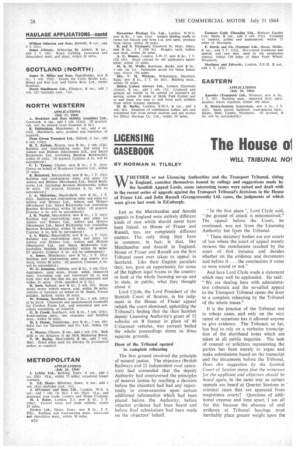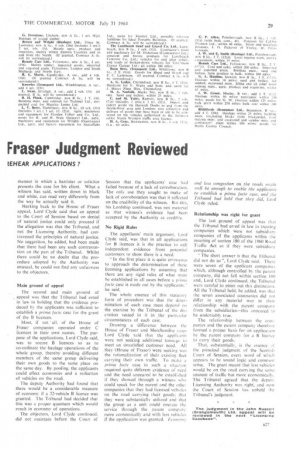LICENS I NC CASEBOOK
Page 30

Page 31

If you've noticed an error in this article please click here to report it so we can fix it.
The House ol Fraser Judgment Reviewed
BY NORMAN H. TILSLEY
WILL TRIBUNAL NO
tEHEAR APPLICATIONS?
WHETHER or not Licens:ng Authorities and the Transport Tribunal, sitting in England, consider themselves bound by rulings and suggestions made by the Scottish Appeal Lords, some interesting issues were raised and dealt with in the recent series of appeals against the Transport Tribunal's decisions in the House of Fraser Ltd. and John Russell (Grangemouth) Ltd. cases, the judgments of which were given last week in Ed:nburgb.
Just as the Merchandise and Arnold appeals in England were entirely different kinds of case which should never have been linked, so House of Fraser and Russell, too, are completely different matters. The only thing they have in common, in fact, is that, like Merchandise and Arnold in England, House of Fraser and Russell are the first Tribunal cases ever taken to appeal in Scotland. Like their English parallels they, too, gave an opportunity for sonic of the highest legal brains in the country to look at the whole licensing set-up and to state, in public, what they thought about it. •
Lord Clyde, the Lord President of the Scottish Court of Session, in his judgment in the House of Fraser appeal (which the court dismissed, upholding the Tribunal's finding that the then Scottish deputy Licensing Authority's grant of 32 vehicles on B licence in place of 40 C-licensed vehicles, was correct) boiled the whole proceedings down to three separate grounds.
Door of the Tribunal opened to complete rehearing The first ground involved the principle of natural justice. The objectors (British Railways and 22 independent road operators) had contended that the deputy Authority had contravened the principles of natural justice by reaching a decision before the objectors had had any opportunity to cross-examine upon certain additional information which had been placed before the Authority, before objector evidence had been heard and before final submissions had been made on the objectors' behalf. "In the first place ", Lord Clyde said, "the ground of attack is misconceived." The appeal before the Court, he continued, was not from the Licensing Authority but from the Tribunal.
"These statutory bodies are not courts of law where the court of appeal merely reviews the conclusions reached by the court of first instance and decides whether on the evidence and documents laid before it . .. the conclusions it came to were sound or not."
And here Lord Clyde made a statement which may well be applauded. He said: "We are dealing here with administrative tribunals and the so-called appeal to the Transport Tribunal opens the door to a complete rehearing by the Tribunal of the whole issues."
It is the practice of the Tribunal not to rehear cases, and only on the very rarest of occasions has it allowed anyone to give evidence. The Tribunal, so far, has had to rely on a verbatim transcription of the shorthand notes which are taken at all public inquiries. The task of counsel or solicitors representing the parties has been merely to argue and make submissions based on the transcript and the documents before the Tribunal. Does this .suggestion by the Scottish Court of Session mean that the witnesses for the applicant and objectors should be heard again, in the same way as certain appeals arc heard at Quarter Sessions in criminal cases that are appealed from magistrates courts? Questions of additional expense and time apart, I am all for this because the absence of oral evidence at Tribunal hearings must inevitably place greater weight upon the
manner in which a barrister or solicitor presents the case for his client. What a witness has said, written down in black and white, can read very differently from the way he actually said it.
Harking back to the House of Fraser appeal, Lord Clyde said that an appeal to the Court of Session based on denial of natural justice could only proceed if the allegation was that the 'tribunal, and not the Licensing Authority, had contravened the principles of natural justice. No suggestion, he added, had been made that there had been any such contravention on the part of the Tribunal. Whilst there could be no doubt that the procedure adopted by the Authority was unusual, he could not find any unfairness to the objectors.
Main ground of appeal
The second and main ground of appeal was that the Tribunal had erred in law in holding that the evidence produced by the applicants was sufficient to establish a prima facie case for the grant of the B licences.
Most, if not 'all, of the House of Fraser companies operated under C licences in their own names. The purpose of the applications, Lord Clyde said, was to secure B licences so as to co-ordinate the haulage operations of the whole group, thereby avoiding different members of the same group delivering their own goods to the same place on the same day. By pooling, the apphcants could effect economies and a reduction of vehicles on the road.
The deputy Authority had found that there would be a considerable measure of economy if a 32-vehicle B licence was granted. The Tribunal had decided that this was a proper quantum which would result in economy of operations.
The objectors, Lord Clyde continued. did not maintain before the Court of Session that the applicants' case had failed because of a lack of corroboration. The only use they sought to make of lack of corroboration was that it reflected on the credibility of the witness. But this, his Lordship continued, was not material as that witness's evidence had been accepted by the Authority as credible.
No Rigid Rules The appellants' main argument, Lord Clyde said, was that in all applications for B licences it is the practice to call independent evidence from .potential customers to show there is a need.
In the first place it is quite erroneous to approach the determination of these licensing applications by assuming that there are any rigid rules of what must be established in all cases before a prima facielcase is made out by.the applicants." he said.
The whole essence of this statutory form of procedure was that the determination of each case must depend on the exercise by the Tribunal of the discretion vested in it in the particular circumstances of each case.
Drawing a difference between the House of Fraser and Merchandise cases Lord Clyde said that the applicants were not seeking additional tonnage In meet an Unsatisfied customer need. All they (House of Fraser) were seeking was the rationalization of their existing fleet carrying their own traffic. "bo make a prima facie case in such a situation required quite different evidence of need and the need appeared to be established if they showed through a witness who could speak for the Parent and the other companies that they had licensed vehicles on the road carrying their goods: that they were substantially utilized and that the group as a unit could operate the service through the parent company more economically and with less vehicles if the application was granted. Economy and less congestion on the roads might well be enough to enable the applicants to establish a prima fade case, and .the Tribunal had held that they did, Laid Clyde ruled.
Relationship was right for grant
The last ground of apneal was that the Tribunal had erred in law in treating companies which were not subsidiary, companies of the applicants within the meaning of section 180 of the 1960 Road Traffic Act as if they were subsidiary companies,
" The short answer is that the Tribunal did not do so", Lord Clyde said. There were seven of the applicant companies which, although controlled by the parent company, did not fall within section 180 and, Lord Clyde continued, the Tribunal were careful to pbint out this distinction. All the Tribunal held, he added, was that the seven associated companies did not differ in arty material way in their relationship with the parent company from the subsidiaries—this appeared to be undeniably true.
The relationship between the companies and the parent company therefore formed a proper basis for an application by the parent company for a B licence to carry their goods.
That, substantially, is the essence of the principal judgment of the Scottish Court of Session, every word of wl*Ii appears to be sound logic and common sense. The grant meant that less vehicles would be on the road carrying the Salre amount of traffic hut more economically. The Tribunal agreed that the deputy Licensing Authority was right, and now the Court of Session has upheld the Tribunal's judgment.








































































































